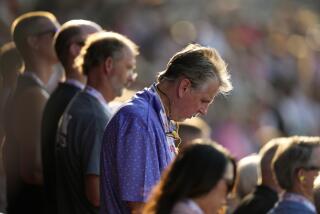Obama: U.S. must face up to the kind of violence that happened in Charleston
Reporting from Washington — At a town hall meeting in South Carolina this year, President Obama looked back on the most difficult moment of his presidency — the shooting deaths of 20 children and six educators in the Newtown school massacre in Connecticut — and expressed regret over his inability to enact stricter gun laws.
It was “the hardest day of my presidency,” he said. “And I’ve had some hard days.”
Faced Thursday with yet another major gun crime on American soil, this one at a black church in Charleston, S.C., about 115 miles from where he spoke in March, the normally even-keeled president did not hide his anger.
“At some point, we as a country will have to reckon with the fact that this type of mass violence does not happen in other advanced countries,” he said. “It doesn’t happen in other places with this kind of frequency.”
In an eight-minute statement in which he was at turns frustrated and mournful, Obama renewed his vigor for increased limits on access to guns and, as a president nearing his final months in office, seemed to feel freer to raise the vexing political issue just hours after learning of the attack.
He blamed the shooting on someone “who wanted to inflict harm [and] had no problems getting their hands on a gun.” He said it was “particularly heartbreaking” that the victims were gunned down in a place of worship, and decried the rate of mass shootings in the U.S. as all too frequent. He quoted the Rev. Martin Luther King Jr. Aides said he insisted that he address the issue in person — his 14th statement as president on a mass shooting.
RELATED: Charleston church shooting victims: Who they were
The shooting in Charleston added two new elements to the president’s reaction: a personal and racial connection. Obama knew the church pastor who was killed; and the Justice Department is investigating the massacre as a hate crime — the victims were all black and the suspect is white.
As a presidential candidate, Obama had met the Rev. Clementa Pinckney, who also was a state senator, and other members of the congregation. Pinckney became an Obama supporter in that tough 2008 campaign, forging a bond with him that “was strong enough to endure all the way until today,” a White House spokesman said.
Obama spoke Thursday with the mayor of Charleston to express his condolences, as did Vice President Joe Biden, who had visited with Pinckney last year at a prayer breakfast.
During Obama’s presidency, shootings — including those at the Connecticut elementary school, near a college campus in Isla Vista, at the Washington Navy Yard and at a Sikh temple in Wisconsin — have brought about cries for legislative action to limit gun sales. Following Newtown, a measure in the Senate to expand background checks on would-be gun buyers fell a handful of votes short of being adopted in what became the only significant effort to enact new gun rules at the federal level.
The president, in his visit to South Carolina in March, had lamented that it seemed the carnage at Newtown would have been “enough of a motivator for us to want to do something about this. And we couldn’t get it done.”
The president has otherwise been reluctant to revisit the fight for new legislation, as intractable a fight as any in Washington, when his influence has been needed elsewhere. But, he said pointedly on Thursday, “It is in our power to do something about it.”
Still, he indicated he had little expectation that Congress would act any differently this time.
“The politics in this town foreclose a lot of those avenues right now. But it would be wrong for us not to acknowledge it,” he said. “At some point it’s going to be important for the American people to come to grips with it, and for us to be able to shift how we think about the issue of gun violence collectively.”
The apparent racial motivation to the attack was a reminder, Obama said, of “a dark part of our history.”
The nation’s first black president has put greater attention this year on issues surrounding America’s historic struggle with race. Two days after that March visit to South Carolina, he delivered an address in Selma, Ala., that highlighted progress since scores of blacks trying to march to Montgomery were beaten back by state troopers on Bloody Sunday there half a century ago, but he also declared that “our march is not yet finished.”
Obama has also been forced to confront tensions highlighted by a series of encounters between law enforcement and young minorities, including the deaths of unarmed black men in Ferguson, Mo., and Baltimore that sparked sometimes violent demonstrations.
Obama said Thursday that while racial hatred was a threat “to our democracy and our ideals,” he was confident the reaction to this latest incident “indicates the degree to which those old vestiges of hatred can be overcome.”
He quoted King’s comments after the death of four young girls in the 1963 bombing of an Alabama church, saying: “Their death says to us that we must work passionately and unrelentingly for the realization of the American dream.”
For more White House coverage, follow @mikememoli
More to Read
Sign up for Essential California
The most important California stories and recommendations in your inbox every morning.
You may occasionally receive promotional content from the Los Angeles Times.











